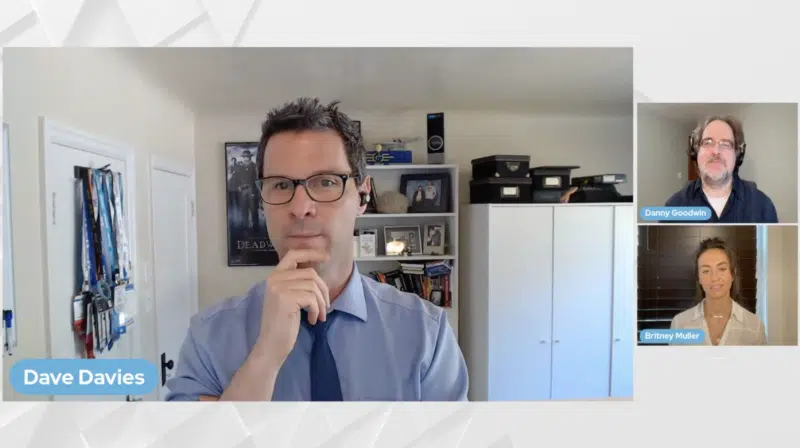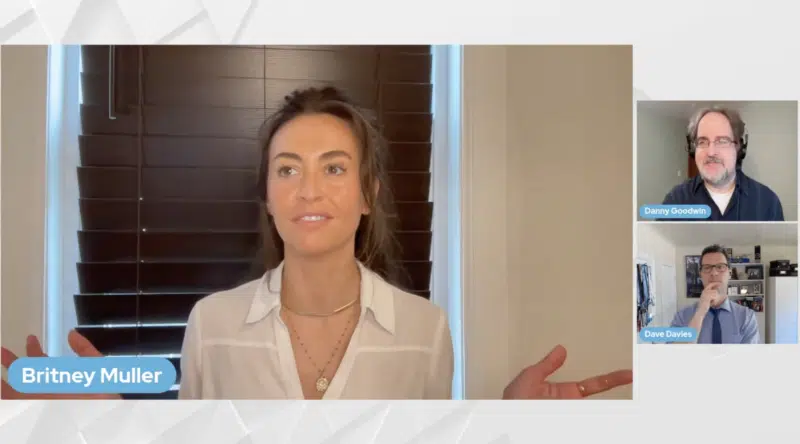How generative AI will change search engine optimization (SEO) as a profession

[ad_1]
Generative AI will revolutionize the SEO industry, but maybe not in the way you think.
Yes, your day job as an SEO will likely look different in a few years. But will robots replace you?
“Absolutely not,” said Brittney Mueller, marketing and SEO consultant for Data Science 101, and Dave Davies, team leader for Inflating Weights and Biases. But there is no denying that the industry is evolving.
So how will generative AI change SEO as a profession and what can you do to stay ahead of the curve? Mueller and Davies shared their thoughts on generative AI and the future of SEO in SMX Advanced.
Artificial intelligence does not replace search engine optimization
Mueller was adamant that AI would not come to search engine optimization jobs. However, I note that the industry has to adapt depending on how Google integrates AI into search results:
- “Artificial intelligence is not the be-all and end. In fact, I think the brilliance will start to fade as we continue to see the limitations of LLMs and the amount of extra work required to do things well.
- “MBA holders face many problems that the researchers building this technology have not yet been able to solve. It is based on a probability distribution and is not always realistic.
- “Google has been retrieving information very well within search, and I think LLM certifications could be a great addition to better identify the questions people are asking and show additional information.”
Technical SEO will have an advantage
Davies added that technical SEOs may be better positioned to deal with the change that generative AI brings than those specialized in content SEO:
- Google’s John Mueller said that as long as websites are being read by machines, technical SEO will remain just as important. I think that sums up exactly the kind of world we’re heading into now.
- “I think technical SEO will have some advantages – but content SEO will eventually follow. It just has to change. I think the structure they’re going to improve on will change.

Links may develop
Both Davies and Mueller agreed that the links may change in form and will not be an important factor in classification in the future. Things like bookmarks or references to a site may become more valuable links than traditional links. As Davies explained:
- “I’m not saying link building has stopped, but I think its value is about to be overhauled. It will evolve and may not look like the traditional links we know and use today – but a version of that instead.
- “Think about the way LLMs are built in this language space. They use tokens and they use relationships to make connections. These things are still very important.”
- “The whole job of neural networks is to bring about understanding between different things, and so I think that will still have weight – but it might not seem as specific as connections and link building. Maybe it could be mentioning instead? Maybe it could take the form of something else and evolve.”
Instant customization is key
SEOs will need to master rapid AI personalization to achieve the best results, according to Mueller. Fine tuning based on goals and data is critical to a one-size-fits-all approach.
- “You really need to personalize claims and learn about spot engineering and do that stuff strategically. I know Andrew Ng just came out with a really cool, fast way Of course, in partnership with Open AI, on this very topic and did a great job of explaining those key concepts. “So I will definitely check that out,” Mueller said.
- “ChatGPT actually has an API that you can use to customize prompts. It makes things a little bit easier for the people I work with, for my teams, for my clients, and it kind of puts the power in their hands as to how we need to handle this through an iterative process.
Save time creating content
Many SEOs explore generative AI to create content, including headlines, product descriptions, and articles. There are current concerns about the quality of the responses, however, and it is possible that these issues will be resolved over time, as Davies noted:
- “Generative AI can write fine. Is it right all the time? No, it’s just a little hack for now. But going forward, this will speed things up – as with tasks I’d previously done manually like Looking at the entities on the page.
- “I still need to use my brain and move on, I (generative AI) missed this and that. Then I also need to check the facts. But this will probably save me half an hour per piece of research.”

The search may extend beyond web pages
In the future, research may move beyond web pages to new environments that do not exist on the web today.
- “In the next five years, I think we’re going to see a transition into two different kinds of landscapes. I think the research is going to taper off a bit and move into, I don’t want to say Metaverse, but into different environments that don’t exist now,” Davies said.
Code simplification
Mueller already uses ChatGPT extensively as a code helper, which highlights that it’s particularly adept at tasks like generating Python scripts:
- “I think it’s important to note that code by its very nature is meant to be unambiguous, unlike human language, so generative AI is much better, in my opinion, at generating accurate code output for the things I’m trying to accomplish, whether that’s a Python script For software or just data cleaning pandas.It’s great at those tasks.
Get the daily newsletter that search marketers depend on.
Wise use is required
Although generative AI will transform SEO as a profession, careful application is still necessary because of the potential for incorrect uses – which is why Mueller doesn’t believe this technology marks the end of SEO as a profession. At least not yet.
- “Remember, generative AI is a prediction model based on probability distribution. So if you imagined it was just reading, say, 100 books that were in the realm of sci-fi, and you asked it a medical question, it wouldn’t do the trick. But it might be fine,” Mueller said. really spawning a new sci-fi character.”
- “Given this context, generative AI is only as good as the text and information on which it is trained, which is inherently problematic because ChatGPT and LLMs are essentially trained on the entire web, which is not the best place to have fully realistic information or have representation across Marginalized groups of persons and subjects.
- “These models don’t have feelings. They don’t make sense. They don’t have common sense like humans. And so you have to be really careful about how you use them, because it’s very easy when I put in a prompt to automate the bias that you already have by the sheer nature of how you ask the question, it’ll This chain of thought follows.
[ad_2]
Source link




